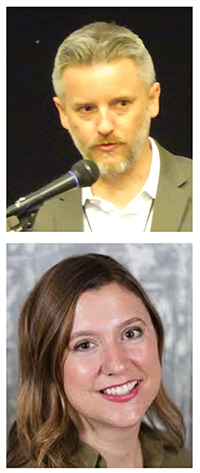In the time of COVID-19 and social distancing, literary organizations face a difficult reality regarding in-person festivals and conferences. Dozens of events previously scheduled for the summer of 2020, some years in the making, have been canceled or postponed—events that typically bring together hundreds and thousands of readers, writers, and literary enthusiasts. The Squaw Valley Writers Workshops were slated to celebrate their fiftieth anniversary in July and will postpone most programming until 2021, and as of this writing the ninety-fifth Bread Loaf Writers’ Conference, tentatively scheduled for August, has yet to announce if it will proceed.

Ed Southern, executive director of the North Carolina Writers’ Network, and Steph Opitz, founding director of Wordplay.
But as stay-at-home orders swept the United States this spring, many organizers felt a more pressing need for community connection than ever before and sprung into action, reimagining their events in new, online formats. The Split This Rock poetry festival, originally scheduled for March in Washington, D.C., quickly pivoted to offer a virtual social-change book fair and livestreamed readings throughout May and June. The Conversations & Connections conference, sponsored by the literary magazine Barrelhouse, was replaced with a virtual Spring 2020 Read-In and Write-In, which launched on March 15, featuring a book group and workshops with guest lecturers and sprint writing sessions. The North Carolina Writers’ Network reenvisioned its daylong spring conference as the 2020 Cabin Fever Conference, an event held from April 16 to April 18, complete with open mic readings and a “virtual exhibit hall” of links to websites for presses based in North Carolina.
“People were grateful for the chance to connect, even if it was online through Zoom,” says Ed Southern, executive director of the North Carolina Writers’ Network. “It was important for us to take a step back and look again at our mission statement and remind ourselves our mission isn’t to put on a spring conference. Our mission is to connect, educate, promote, and serve writers.”
The Jackson Hole Writers Conference, Bay Area Book Festival, and Nantucket Book Festival are also offering virtual programming through various online platforms such as Zoom, YouTube, and social media. While Squaw Valley’s fiftieth anniversary festivities will have to wait until 2021, workshop organizers plan to offer a “Virtual Valley” 2020 summer poetry workshop from June 20 to June 27. And in honor of its forty-fifth anniversary, the Southampton Writers Conference will be held online from July 8 to July 12, with workshop faculty including Billy Collins, Camille Rankine, and Frederic Tuten.
Wordplay is perhaps one of the largest literary festivals to switch to an entirely digital platform on short notice. Hosted by the Loft Literary Center in Minneapolis, the inaugural Wordplay in 2019 boasted more than ten thousand festivalgoers as well as outdoor stages, cooking stages, literary parties, food trucks, and beer tents, in addition to readings, panels, and workshops. Within weeks of Minnesota’s implementation of shelter-in-place orders, Wordplay’s staff reprogrammed the festival, which was, as an announcement on its website quipped, like building a bicycle as you ride it. Originally planned as a daylong event in May, the virtual festival became a monthlong affair that spanned from April 7 to May 9, featuring more than one hundred authors. All events were free to the public. “We were nervous about people showing up, but they have and we’ve already hosted thousands of readers at our events,” says Steph Opitz, founding director of Wordplay, midway through the event. “One thing an in-person festival does really well is support debut authors via foot traffic, and while online programming loses that, it gains access previously denied by location.”
Attendance has been an early concern for the organizers and participants of virtual literary festivals. While virtual platforms have the potential to make offerings more inclusive with lower costs and less physical demands on the attendees, there are still important drawbacks to consider.
“When there is so much uncertainty in the world, and folks are dealing with the hardships and bureaucracy of unemployment and limited access to public computers and new strains on their time,” says Opitz, “the fact that the festival is free only does so much for access.”
Organizers observe that accessibility issues stemming from socioeconomic disparity still arise even when events are offered strictly online. “Despite the lower costs, despite the fact that there’s no need to travel, [the programs are] completely inaccessible to many writers in this state who don’t have broadband,” says Southern. The North Carolina Writers’ Network is engaged in an ongoing “1 in 100” campaign that aims to serve all one hundred counties in North Carolina, but the organizers are still working to support a community that is largely rural and without internet access.
Then there is the question of the financial viability of such events for organizers. “Honestly, we’re still figuring that out,” says Southern. “We rely on our [in-person] programs as a major source of revenue to help pay for all of the resources and services that we provide that don’t bring in revenue.” The 2020 Cabin Fever Conference’s price per class was reduced, and for organizations whose sole revenue stream is ticketing for in-person events, a permanent move to an online platform may be financially impossibe. “Profitability is sort of moot since we made it free,” says Opitz of Wordplay. The festival organizers, like many others, have called for donations to offset the financial burden of transitioning in-person events to online.
Still, the pivot to digital events is not without its successes, as organizers navigate the format’s limitations and work to foster an accessible and connected literary community. New information and better practices are being discovered every day. One Wordplay event with Kate DiCamillo, the Newbery Medal–winning author of books such as The Tale of Despereaux (Candlewick Press, 2003), was reported to have more than thirty thousand online viewers. “We don’t have a venue that could hold thirty thousand people,” says Opitz, “so to be able to do that virtually was really inspiring.”
Thea Prieto’s fiction, reviews, and interviews have appeared in Longreads, the Masters Review, and in other journals. The author of From the Caves (Red Hen Press, 2021), she writes and edits for Propeller and the Gravity of the Thing. Her website is theaprieto.com.








